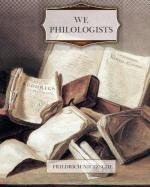77
All the difficulties of historical study to be elucidated by great examples.
Why our young students are not suited to the Greeks.
The consequences of philology.
Arrogant expectation.
Culture-philistinism.
Superficiality.
Too high an esteem for
reading and writing.
Estrangement from the
nation and its needs.
The philologists themselves, the historians, philosophers, and jurists all end in smoke.
Our young students should be brought into contact with real sciences.
Likewise with real art.
In consequence, when they grew older, a desire for real history would be shown.
78
Inhumanity: even in the “Antigone,” even in Goethe’s “Iphigenia.”
The want of “rationalism” in the Greeks.
Young people cannot understand the political affairs of antiquity.
The poetic element: a bad expectation.
79
Do the philologists know the present time? Their judgments on it as Periclean, their mistaken judgments when they speak of Freytag’s[7] genius as resembling that of Homer, and so on; their following in the lead of the litterateurs, their abandonment of the pagan sense, which was exactly the classical element that Goethe discovered in Winckelmann.
80
The condition of the philologists may be seen by their indifference at the appearance of Wagner. They should have learnt even more through him than through Goethe, and they did not even glance in his direction. That shows that they are not actuated by any strong need, or else they would have an instinct to tell them where their food was to be found.
81
Wagner prizes his art too highly to go and sit in a corner with it, like Schumann. He either surrenders himself to the public ("Rienzi”) or he makes the public surrender itself to him. He educates it up to his music. Minor artists, too, want their public, but they try to get it by inartistic means, such as through the Press, Hanslick,[8] &c.
82
Wagner perfected the inner fancy of man . later generations will see a renaissance in sculpture. Poetry must precede the plastic art.
83
I observe in philologists .
1. Want of respect for antiquity.
2. Tenderness and flowery oratory; even an apologetic tone.
3. Simplicity in their historical comments.
4. Self-conceit.
5. Under-estimation of the talented philologists.
84
Philologists appear to me to be a secret society who wish to train our youth by means of the culture of antiquity . I could well understand this society and their views being criticised from all sides. A great deal would depend upon knowing what these philologists understood by the term “culture of antiquity”—If I saw, for example, that they were training their pupils against German philosophy and German music, I should either set about combating them or combating the culture of antiquity, perhaps the former, by showing that these philologists had not understood the culture of antiquity. Now I observe:




